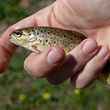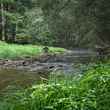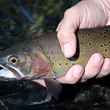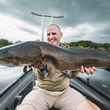“Luckily, though, there are still a few guys around who will look you straight in the eye and say, eloquently and to the point, ‘It’s been too goddamned hot for too long and the river has gone off.’” — John Gierach, Sex, Death, and Fly-Fishing
I cut my fly fishing teeth on John Gierach, and when he first published those words back in 1990, it all seemed innocent enough. Sure, ’88 was a hot son-of-a-gun, and the legendary waters around Yellowstone were beaten up by the heat in ways that nobody back then ever anticipated. Still, it seemed like an anomaly. Weather does crazy stuff. Some years are wet, others are dry; some are hot, some are cold, and some, on those occasions when the fishing gods happen to smile down from on high, are classic ‘Goldilocks' just right. That’s how it always worked, and nobody I knew back in the early ‘90s ever considered that things might end up differently.
Fast forward to 2014, though, and any mention of extreme weather starts to sound ominous.
“Fluctuations in the weather used to be just that, but now, with everyone looking over their shoulders at global climate change, there’s the fear that any extreme could become the new normal. And when you guide fishermen for a living, the thought of your rivers drying up is the stuff of nightmares.”
That’s Gierach again, from his book All Fishermen Are Liars, and he frames our current reality in language that’s awfully hard to ignore. So what is the truth about climate change? What is the “new normal” - and how will it impact us as anglers?
First, let’s define exactly what’s happening. Greenhouse gasses, which we produce when we burn fossil fuels like coal, oil and natural gas, are changing the earth’s energy balance. As our CO2 levels increase, less of the sun’s energy is reflected back into space, while more of it warms our atmosphere and our oceans. Over time, the planet heats up - which is why climate change is also referred to as global warming.
If it helps, you can think of CO2 as the goose down in your down jacket. It turns out a little goose down goes a long way toward keeping us warm & cozy. At the same time, when we add even more down, we hold in more heat. Scientists have known about the heat-trapping properties of greenhouse gasses like CO2 and methane since the 1800s. It’s basic physics.
So what are our scientists saying about global warming? While there are any number of questions that still need to be answered, and complexities that still need to be sorted out, approximately 97% of our climate scientists agree that:
- The earth is warming.
- People are responsible.
- We’re putting our future at risk.
Our National Academy of Sciences, which is considered the gold standard when it comes to science, has called human-caused (anthropogenic) climate change a “settled fact.” They’ve also stated: “Climate change is occurring, is very likely caused primarily by the emission of greenhouse gases from human activities, and poses significant risks for a range of human and natural systems.” In case that isn’t clear enough, they added, “Emissions continue to increase, which will result in further change and greater risks.”
I could go on and on (and on, and on, and on) about the science, but the gist of it is that when we burn fossil fuels, we really do raise the earth’s temperature.
Which wouldn’t be such a big problem if we didn’t see the impacts of those rising temperatures right out our front door. On average, our summers are getting hotter, our winters are getting warmer, our storms are getting stronger and our sea levels are rising. Depending on where you live, that may translate into less snow, earlier runoff, hotter heat waves, more extreme droughts, dying forests, bigger wildfires, more intense rainfall events, more flooding, the spread of disease and invasive species, habitat loss, species extinction …
It’s a whole Pandora’s Box of weather-related afflictions, and none of it is good for fish - or for anglers.
Which, as you may have guessed, leaves us between a rock and a hard place. There’s really no way to roll back the warming that’s already occurred, or to keep the planet from continuing to heat up over the next few decades. Fortunately, though, there’s still time to avoid the catastrophic problems on the horizon.
Bottom line, if we’re going to avoid the worst impacts of climate change, then we have to kick our addiction to fossil fuels and move toward clean, renewable energy. We also - and this is absolutely vital - need to start speaking up. If we don’t raise a little hell, it’s hard to see how we’ll ever change the status quo, or how our politicians will ever say “No!” to Big Coal and Big Oil.
Global warming sucks. There’s really no other way to look at it. It’s a huge, difficult issue that was dumped into the partisan meat-grinder and came out smelling like catfish bait. But that doesn’t mean we can afford to ignore it. Last fall, researchers from the University of Hawaii looked at all the latest climate projections and announced that, with a business-as-usual approach, we have perhaps 35 years left before the average location on the planet shifts to a radically different climate.
In other words, if we don’t get our act together and do something about our CO2 emissions, we’re likely to lose most, or even all, of our fishing.
Here the truth of it. I love to fish. I love it. I love to wade deep into cold, clear water, and I love to cast dry flies for rising trout, and I love the mountains and rivers and forests that make western Montana, where I live, so incredibly special.
I should also point out that I have a 9 year old son who hasn’t done anything - not one damn thing - to deserve a world torn apart by climate change.
If we want to hold on to our fishing, and if we want to share our favorite places - our trout streams and bonefish flats and steelhead rivers - with future generations, then we need to tackle climate change now, while we still have a chance. As the distinguished climate scientist Lonnie Thompson said recently, “Climatologists, like other scientists, tend to be a stolid group. We are not given to theatrical rantings about falling skies. Most of us are far more comfortable in our laboratories or gathering data in the field than we are giving interviews to journalists or speaking before Congressional committees. Why then are climatologists speaking out about the dangers of global warming? The answer is that virtually all of us are now convinced that global warming poses a clear and present danger to civilization.”
That’s right. Our scientists, who “are not given to theatrical rantings about falling skies,” are convinced that “global warming poses a clear and present danger to civilization.”
We’ve messed around long enough. Everything we care about is at risk. It’s time to get serious about kicking our fossil fuel addiction and making the switch to clean, renewable energy.
Todd Tanner is an outdoor writer, a former fly fishing guide, and the president of Conservation Hawks. To learn more about climate change and its impacts on sportsmen, please visit ConservationHawks.org.






























Comments
Kirk @ River Mud replied on Permalink
Well stated, and I agree with you, and this "coastal resiliency" stuff is my day to day business. So I'm there. But I have to ask honestly, all this "act now" stuff.....where does it get us? I remember reading a report about 2 years ago that said that if we stopped burning fossil fuels today, the earth would continue to warm in sort of a negative feedback loop for another 450 or so years. And the reality of course is that we won't stop burning fossil fuels today. Or next year, or by the year 2100. Given the exponential behavior of negative feedback loops, let me estimate then that this global climate anomoly could easily last 1200 years. Or 2000 years.
We switched our home from fuel oil and propane to natural gas 4 years ago - still paying off the bill for that. Going solar as soon as we replace the roof this summer. "Doing something today" on a significant scale means a monetary investment that not everybody can make, even in the world's 2nd (3rd?) wealthiest country. I'd love to take mass transit to work, but despite living in a large east coast city, there's no real transit.
So my question is: what are we actually going to do about it?
Todd Tanner replied on Permalink
Kirk - The most accurate answer, as well as the least satisfying, is that we don’t really know. What I can tell you is that we have the technology right now to shift completely from fossil fuels to renewables, and that doing so would invigorate our economy and set the U.S. up to lead the world forward on renewable energy. But there are a lot of people who stand to lose a lot of money if we keep our fossil fuels buried in the ground, and they’re fighting hard to make sure we burn every last barrel of oil and ton of coal.
On the impact front, the big discussion right now is how to keep global warming to a 2C rise compared to baseline pre-industrial levels. Unfortunately, 2C is likely too high - we’re already seeing nasty impacts at .8C. Even worse, it’s going to be a very difficult target to meet. And anything above 2C starts edging into the range of catastrophic - and then there’s ocean acidification, which is another nasty problem.
The “negative feedback loop” you read about was actually a positive feedback loop, and they’re going on right now. For example, as Arctic permafrost melts, it releases methane gas, which warms the atmosphere, which melts more permafrost, which releases more methane … The “positive” refers to the fact that it’s self-reinforcing, and our single biggest worry is that we’re going to hit a point in the not-too-distant future where positive feedbacks like permafrost melt and loss of Arctic ice take on a life of their own, and the world continues to warm regardless of what we do.
Best case, we get our act together in the very near future, temperatures stabilize in 30-50 years, things are difficult but not impossible, and then life slowly gets better. Worse case, temperatures spiral out of control. Right now, we’re on track for a 5C to 7C temperature rise this century, which would dramatically remake the planet and create a species die-off similar to past great extinctions. Would humans survive in this new world? Nobody really knows. What we do know is that the planet wouldn’t look anything at all like it does right now.
As for individual action: the most important thing you can do is to call your Senators and Representative and demand that they take immediate legislative action on climate. Personal changes in behavior, while important, aren’t going to get us over the hump. There are solutions out there, but they require clear, effective policies at the federal level. The new EPA regs are a start, but they’re not nearly enough. We need to level the playing field between fossil fuels and renewables, and that means we have to put a price on carbon dumping and make fossil fuel companies pay for the problems they’re creating.
Can we pull it off? Can we still give our kids a shot at a decent future? Yes, we can. But it’s not going to be easy, and it’s going to require a huge, concerted effort on the part of groups, like anglers, who are not currently engaged.
And if we’re not successful - if we wait too long before we get involved - then we’re eventually going to lose pretty much everything we care about.
David Anderson replied on Permalink
As someone who's been around the block more than a few times and went to school when they actually taught the truth. This whole global warming (wait,it's now climate change)is getting old. The earths climate is in a consatant flux of heating and cooling. (Has been and will always be so until the sun goes super nova.) Hence the latest retreat of the ice age. Not due to the belief of too much mammoth farts. I prefer not to back to the days of a hores and buggy or ridding bycyles or little scooters. Maybe if you colud convince the chicoms or indians to stop thier industrializtion you might be onto something. For me, I'll continue to drive my pickup and have bbq's.
JVP replied on Permalink
Why does every climate change denier always put forth this argument that "the earth's climate is always changing", as if ANYONE is disputing that fact? Of course the earth's climate is in a constant state of flux. The most basic understanding of weather and climate not only reveals that, but practically demands it be true.
What is of importance isn't whether the climate is changing -- as noted is always is -- but what the PRIMARY VECTOR of that change is. Whether or not human behavior is causing climate change isn't relevant to WHETHER OR NOT IT IS OCCURRING, it is important to WHETHER OR NOT WE CAN DO ANYTHING ABOUT IT.
FACT: The climate is changing.
FACT: The way in which it is changing threatens the survival of the human race.
Those of you who continue to deny that humans are the primary cause of the climate change trends currently underway are concluding nothing more than that we are a) helpless to stop it and are b) therefore doomed to extinction or a severely degraded form of existence.
For my part, because I prefer to put my faith in well established, peer reviewed, virtually undisputed scientific evaluation -- I see plainly that humans are the driving force behind climate change, and therefore realize we aren't powerless to help ourselves.
Hamilton replied on Permalink
Really… Really…? Climate change “threatens the survival of the human race”? I would love to see your “well established, peer reviewed, virtually undisputed scientific evaluation” that reaches that conclusion.
But I do agree with one point you made, what is important is whether or not we can do anything about it.
FACT: The US produces less than 16% of the CO2 emitted worldwide (http://www.statista.com/statistics/271748/the-largest-emitters-of-co2-in...).
FACT: Even if the US stopped emitting CO2, the chance the rest of the world would follow suit is nil.
Fact: CO2 emissions are here to stay, and no amount of hand wringing and/or name calling will change this.
The world needs energy and the most readily available form of energy is fossil fuels.
ginkthefly replied on Permalink
Um, did you read the article you're commenting on? Follow any of the links to said research that it provides?
ginkthefly replied on Permalink
A direct quote from the author, above: That’s right. Our scientists, who “are not given to theatrical rantings about falling skies,” are convinced that “global warming poses a clear and present danger to civilization.”
Hamilton replied on Permalink
Sorry, this article does not satisfy the requirement of a "well established, peer reviewed, virtually undisputed scientific evaluation".
Chad Shmukler replied on Permalink
Perhaps not, Hamilton. But bear in mind that the article links to a number of studies and sources which would most certainly meet that description.
Hamilton replied on Permalink
Sorry again but none of the links I followed were to sources that met that description and I think I followed them all. But I'm willing to be corrected...
ginkthefly replied on Permalink
Linked are studies and data supported and published by the British Royal Academy of Sciences, the US Departments of Energy, Commerce, Agriculture, State, Health and Human Services, Transportation, the US EPA, NASA, the Smithsonian Institution, the National Science Foundation, the National Academy of Sciences and so on ...
I don't know how much more mainstream, well-established and peer reviewed you get in terms of sources than those.
Hamilton replied on Permalink
Yes, but none of them come to the conclusion you suggest. I.e. "climate change threatens the survival of the human race”
Kirk @ River Mud replied on Permalink
Honestly I think you guys are splitting hairs at this point. "threatening the human race" may be an overstatement but "threatening our ability to maintain our current way of life and global population" is, I think, a very fair and balanced statement based on the science focused on increased vulnerabilities associated with the indirect impacts of climate change. Like, say, having two full size hurricanes come up the Chesapeake Bay (15 million American residents) in a 6-day period like they did 3 years ago.
Hamilton replied on Permalink
Hey Kirk, I appreciate your acknowledgement of the “overstatement”… but I don't see this as an overstatement, more of an hysterical statement, designed to elicit an emotional response rather than an intellectual one.
Sort of like your statement about the “two full size hurricanes” coming up the Chesapeake Bay 3 years ago. As far as I can see the only two storms anywhere near the Chesapeake bay around 3 years ago were Hurricane Irene (August 27-28, 2011) and the remnants of Tropical Storm Lee (September 6-9, 2011). I'll give you the benefit of the doubt and assume you misspoke.
For the record, the Chesapeake bay has had multiple hurricanes / large storms traverse it in a 6 day period on several occasions;
• 1928 – Remnant tropical cyclones (August 11-12, August 16-17)
• 1955 – Hurricanes Connie and Diane (August 12 and 18 respectively)
• 2004 – Hurricanes Frances (Sep. 8), Ivan (Sep. 17), and Jeanne (Sep 28) (Surprised you didn't mention this set as it’s much more dramatic)
So, this is hardly unprecedented and has likely happened dozens if not hundreds of times during the past millennia or so, possibly due to climate change but (and I know I’m going out on a limb here) not likely due to human caused climate change…
As for what it would take for ME to change MY perception and take the threat from human-caused climate change seriously… probably if the folks over at MSNBC and CNN started agreeing that this was much ado about nothing… I would have to reconsider my position for sure. ;-)
JVP replied on Permalink
Hamilton/Kirk - For what it's worth, by "survival of the human race" what I meant was "survival of the human race as we know it."
Do I think all out extinction is possible? Yes? Likely? No.
BUT ... "as we know it" doesn't mean a slightly modified version of what we have now. It means a world characterized by drought, famine, widespread destruction and one that may see a massive culling of the population. There is a very real possibility that we're headed towards a very bleak and very scary world.
Kirk @ River Mud replied on Permalink
I've taught entire college classes on the decline of agriculture (in acres) that's occurring with the increase in human population (likely unsustainable over about 10.5 billion, projected to increase (briefly) to about 17-18 billion). But all that science and data and worrying over ineffective political solutions are more suited to an in person conversation at a location that serve either ample amounts of coffee, liquor, or both.
Hamilton replied on Permalink
LOL! JVP, you left out, "Human sacrifice, dogs and cats living together... mass hysteria!".
Thanks for the chuckle...
But I can see there is little point in continuing this line, if there are others reading this thread who are interested in a reasoned discussion, I suggest you point your browser to;
www.wattsupwiththat.com
You will find intelligent discussions from both side of the issue, if you are willing to read them.
Todd Tanner replied on Permalink
Hamilton - I've been following the comments on this particular piece, and I've been enjoying the back & forth. It's nice to see folks disagreeing without being too disagreeable. But I do want to point out that Watts Up With That is the last place to go for a reasoned discussion on climate change. It's a denier site with a strong political agenda, and it's a very, very poor source for accurate scientific information or intelligent discourse. If anyone who's reading these comments wants to learn more about actual climate science, they're far better off researching the links in the original post, which will point to nonpartisan science rather than AW's deliberate attempts at propaganda.
Hamilton replied on Permalink
Hey Todd, thanks for your comments on the discussion… but I have to say I’m disappointed you felt compelled to label www.wattsupwiththat.com as a “denier site with a strong political agenda” and “deliberate attempts at propaganda”. So much for “disagreeing without being too disagreeable” :-)
So, here we go again… please refer those of us still reading this discussion to an article from www.wattsupwiththat.com that support your claims…
Todd Tanner replied on Permalink
Hi Hamilton,
Sure thing. I’ll include the WUWT post, the link and a handful of relevant quotes.
Quote of the week – dirty rotten scoundrels edition (June 30, 2014) by Anthony Watts:
“climate zealotry has gotten out of control” - Anthony Watts, post
“The warm-mongers are losing the war …” - Jimmy Haigh, comment
“Modern science is religion. It’s called scientism. Been like that for quite a while now. No bigger mythology than the dispassionate scientist following the evidence wherever it leads. Sorry but there is nothing more trenchant and pigheaded than current scientific orthodoxy.” - LogosWrench, comment
“A moral man will do what is right even when no one is looking. We have very few ‘scientists’ in the climate field who meet that standard in my view and experience.” - Mark Stoval, comment
“A lab coat is the (would-be) emperor’s new clothing.” - rogerknights, comment
http://wattsupwiththat.com/2014/06/30/quote-of-the-week-dirty-rotten-sco...
Bastardi: ‘potential nightmare.. a tropical cyclone coming at the outer banks on the July 4 weekend’ (June 30, 2014) guest post by Joe Bastardi
“an agenda out there to take any weather event that attracts attention and turn into into a reason that an AGW driven atmospheric apocalypse is upon us” - Joe Bastardi, post
“Weathermen are the Scientists; Climatologists the Believers. Climatologists are like Creation Scientists: anyone who casts doubt on their dogma is branded anti-science.” - Jeff Glassman, comment
The 97% consensus – a lie of epic proportions (May 17, 2013) - Anthony Watts, post
“Proving that crap can flow uphill, yesterday, John Cook got what one could consider the ultimate endorsement. A tweet from the Twitter account of the Twitterer in Chief, Barack Obama, about Cook’s 97% consensus lie.” - Anthony Watts, post
““Consensus” is the new “fraud.” - philincalifornia, comment
http://wattsupwiththat.com/2013/05/17/to-john-cook-it-isnt-hate-its-pity...
Finally, a couple relevant quotes:
Harvard-trained palaeoanthropologist Greg Laden @ ScienceBlogs: “You may know the blog What’s Up With That. It is Anthony Watt’s anti-science blog, dedicated to climate change denialism.”
M.I.T.-trained physicist Joe Romm @ Climate Progress: “we have long-time Heartland partner Anthony Watts, who runs the most extreme anti-science, anti-scientist website in the blogosphere, WattsUpWithThat.”
Oh, and as Joe Romm pointed out, Anthony Watts, who runs WUWT, has admitted accepting funding from the climate-denying Heartland Institute, which has compared people who are concerned about climate change to Charles Manson and the Unabomber.
I hope it's starting to become clear why I labeled WUWT as a denier site.
Hamilton replied on Permalink
Hey Todd,
You provided links to two posts on www.wattsupwiththat.com, neither of which claim that AGCC is not occurring (i.e. denying it), so I’ll just assume you couldn’t find one. So, I assume you are basing your claim on the quotes you provided from Greg Laden and Joe Romm.
For those interested in “the rest of the story”;
Here is a link to a post by Anthony Watts on the quote by Greg Laden: www.wattsupwiththat.com/2013/01/16/greg-laden-liar
Here is a link to a post by Anthony Watts on the quote by Joe Romm: www.wattsupwiththat.com/2012/02/15/some-notes-on-the-heartland-leak
But what can you say about Joe Romm… he has been sliming people for a long time: www.rogerpielkejr.blogspot.com/2012/05/joe-romm-is-liar.html
But I what I think is interesting is www.wattsupwiththat.com was voted “Best Science or technology Blog” for three years in a row (2011, 12, 13) and “Weblog of the year” the last two (2013, 14) by the readers of weblogs in the “Bloggies”.
So, unless you believe the vast majority of weblog readers are “deniers”, this has to tell you something… and if you do believe the vast majority of weblog readers are “deniers” well, there’s not much more we have to know.
Todd Tanner replied on Permalink
Hamilton - Thanks for sharing your comments. You make some interesting assumptions, and you have a rather unique understanding of logic … but at least the picture is starting to become clearer.
Two questions for you. I’d appreciate as much honesty as you can bring to bear.
Do you fly fish? (I noticed that you’ve never commented on Hatch before, which seems a little strange given all your comments on this particular post.)
What are your personal views on climate change?
Hamilton replied on Permalink
Todd – Wow, I'm impressed… you have determined my understanding of logic from so few correspondences, you must be really smart. Oh, and I'm so happy to hear your “picture” is starting to become clear...
But I'm not surprised, those who can’t argue their point often resort to “argumentum ad hominem”, as if somehow insulting me advances your side of the argument.
Well, I can see this avenue of discussion is spiraling down now so I will thank you for the opportunity to share my opinion with your readers and say goodbye.
Kirk @ River Mud replied on Permalink
Well, I lived through though storms (actually was still catching trout after the first one), so pardon my hazy memory of the details. Taking two tropical systems on the chin in 10 days is notable. That 50% of such occurrences in the last 100 years have happened in the last 10 years sure is striking to me (as is the fact that it's happened twice in the last 10 years at all).
If you, or anyone interested in this debate, are getting your information from cable news or sensationalized net news (from Breitbart and WND to Daily Kos and Jezebel), then I think that you can admit that it's just not a serious issue for you one way or another. That 's a reasonable standpoint, I think, (and slightly to my original point), since a million other problems are at our collective front door every day, begging for attention. Is it good enough to preserve our way of life another 100-500 years into the future? I'm not sure.
Hamilton replied on Permalink
Fair enough Kirk, misspoke / hazy memory, pretty much what I figured…
And your right, I don’t take this issue seriously, because in my opinion it’s just a hyped up issue to elicit funding for a plethora of entities that survive on the public dole.
Not quite sure what you mean by: “Is it good enough to preserve our way of life another 100-500 years into the future? I'm not sure” but I’d be interested to hear.
Kirk @ River Mud replied on Permalink
I mean that, as someone who *has* actually worked in the computer modeling labs (NASA GCLP 1997-1998), I'm less concerned with assigning blame and more concerned with whether another 500-year storm comes (as one did in 1999) and wipes the east coast (or gulf coast, or west coast) off the face of the earth. I work in stream construction, so it's unnerving to have a site torn apart and see in a period of a few months, a 75 year storm, two 10 year storms, and four 2 year storms blow through it. Statistically possible under a non-climate change scenario? Sure, statistically. Our coastlines have increasing populations (and an increasing number of poor people), and increasingly hardened/fixed infrastructure. It's in no way to resilient to any significant, repeated weather threat. People will die. Lots of them. Maybe enough to reactivate malaria or another disease and kill a whole ton of us. That's where I was going with that.
Todd Tanner replied on Permalink
Hey David Anderson, thanks for sharing your thoughts. As the guy who wrote the piece, I have a question for you. (Serious, rather than rhetorical.) What would it take for you to change your mind on climate change? I've done a huge amount of research on the subject (thousands and thousands of hours), and one of the things I've learned is that simply sharing the science isn't usually enough to change someone's mind. So just to satisfy my curiosity, is there anything you can imagine that would change your perception and make you take the threat from human-caused climate change seriously? What if you talked to a couple of actual climate scientists? What if Rush Limbaugh and the folks at FOX News admitted that they'd been mistaken all along? What if you started to notice changes impacting the places you fish? Could you imagine anything at all changing your mind, or are you simply set in stone when it comes to climate change?
Kirk @ River Mud replied on Permalink
I'd be interested to hear this as well.
Pages